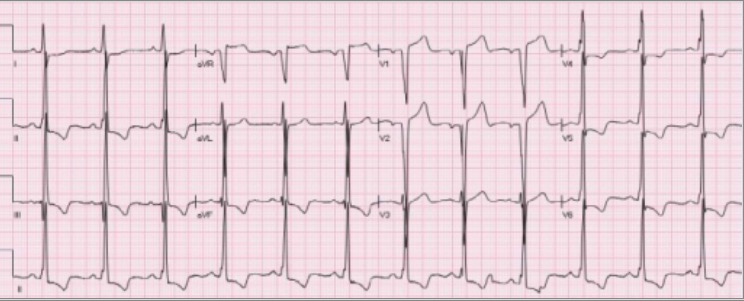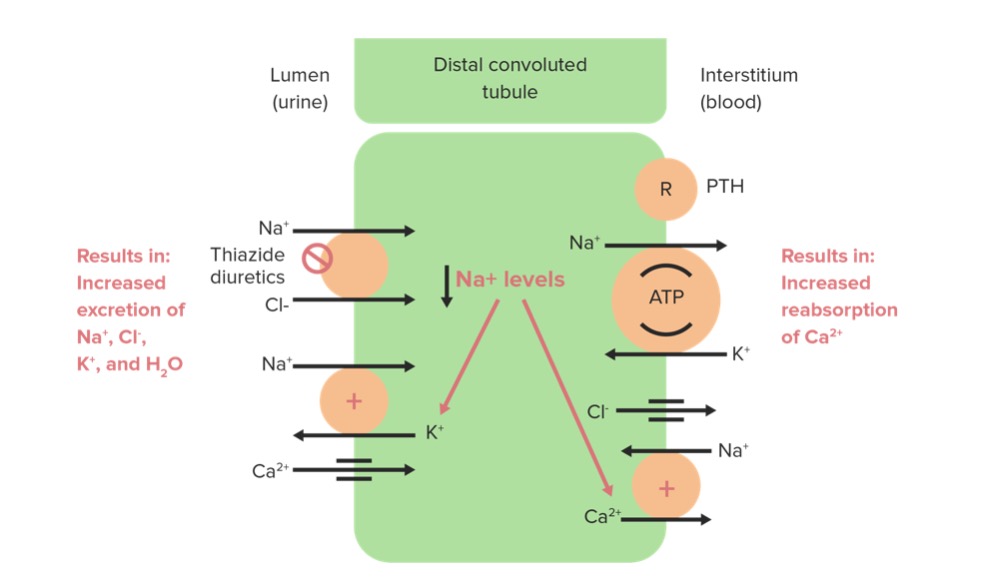Playlist
Show Playlist
Hide Playlist
Hypertension: Urgency vs. Emergency
-
Slides Hypertension.pdf
-
process of diagnosis - hypercortisolism.pdf
-
Download Lecture Overview
00:01 There are two types of hypertensive issues that you wanna pay attention to. 00:06 One is going to be urgency, the other one will be emergency. 00:10 Please take a look at the differences. Good. Urgency, what does that mean? Well, let's say that you get a cut. Some mechanical object introduces a cut. 00:20 You're going to go to an urgent care. An urgent care, but if you get into a car accident? And you're massively hemmorhaging. You're not going to go to an urgent care. 00:31 Where are you going? You're going to the ER, the emergency room. Same concept. 00:35 Here however, I want you to apply it to hypertension. Urgency, do you need treatment? Yes, you do. But you have a little bit more time to deal with this. 00:44 Take a look at the blood pressure. We have a systole of 180, and a diastole of 120. Wow. 00:50 What's normal? 120/80, and we have 180 and 120. 00:56 But the most important point is the fact that the organs are not affected. 01:00 Now, what organs might you be thinking about when you have hypertension? You should be thinking about the heart, you should be thinking about the kidney, but notice, please, that there's no end organ damage. 01:11 Definition of urgency hypertension. 01:14 Hypertensive urgencies usually present in otherwise stable patients who have discontinued or are non-compliant with antihypertensive therapy. 01:22 Treatment is reinstitution of therapy or an increase in the dosage of antihypertensive drug therapy. 01:28 There is no indication for hospitalization, immediate reduction of blood pressure, or referral to the emergency department or ICU. 01:36 What about emergency? You see this list here. 01:39 It's not my job to make sure that all I'm doing is reading a list, nor is it your job to memorize it. 01:44 It's the fact that as you go from head to toe, and you have hypertension that is so high, guess what? You're actually causing end organ damage. Let's begin with the brain. 01:55 There's enough pressure in which the brain paranchymize being damaged. 01:59 What's this called? Good, encephalopathy. 02:02 What if it's enough damage that's taking place in the blood vessel leading to the brain? What does that result in? That's not encephalopathy. That's called a stroke. 02:11 So, what's our patient going to result in? What did I just do? It's the fact that maybe my speech gets impeded. 02:18 Maybe there's one side of the body which doesn't wanna move anymore. 02:22 Some type of stroke like issue, maybe it's hemorrhagic, maybe it's ischemic. 02:26 What kind of hypertension? Emergency. Is an organ being damaged? Of course, there is. That's definition of emergency. What do you wanna do with treatment? Immediate treatment. We haven't gotten to treatment yet, but we shall. 02:38 Next, we do a funduscopic examination. What are you checking for? We're checking for the retina. Are you there? Don't just look at me. 02:46 You wanna -- well, look at me, but I want you to look into my retina. 02:49 How are you gonna do that? Not with your naked eye, with a funduscopic examination. 02:52 What are you gonna notice? Papilledema. Wow, hypertension is quite high. 02:56 What are you worried about? Emergency hypertension. 02:59 What do you wanna do? Immediate therapy. Let's continue. 03:02 Well, the heart gets damaged. What's that called? Congestive heart failure, CHF. 03:08 So, what do you wanna provide? Advanced cardiac support. 03:11 Put those together, please. ACS, CHF. What's going on? Organ being damaged. 03:16 What kind of hypertension? Emergency. Urgency? Mm-mm. 03:19 High hypertension, but in urgency, the organs remain pretty much intact. 03:23 Dissection, what's that mean? I want you to take a hose. 03:27 Take a hose and I want you to turn up the pressure so high, but at some point, the hose can't take it anymore. 03:33 What's it gonna do? It will dissects right through there. 03:35 What's this hose that I'm referring to? In your body, it's called the aorta. Huh? And the aorta, if there's enough hypertension, at some point, what's gonna happen? You're gonna dissect right through. Think about anatomy. Close your eyes. 03:47 Think of the anatomy. What do we have? Intima, media, adventitia. 03:51 You might then do what? Dissect right through. 03:54 And when you do so, isn't that emergency? How's that patient gonna present to you, please? Stabbing back pain. 9 out 10, 10 out of 10, stabbing back pain. Welcome to dissection. 04:04 What about the kidney? Is that going to undergo damage? Of course, it will. What's that called? Acute renal failure. 04:11 Please look at ARF. If there's enough kidney damage, what may then happen? What -- you might release RBCs. What's this called? Hematuria, clinically. 04:19 Finally, we have enough damage that's taking place in your blood vessels. 04:23 What may then happen to the RBC as it traverses through the blood vessel? It might get damaged. What's that called? Microangiopathic hemolytic anemia, MAHA. Is that clear? Now, earlier I said that we have a little bit more time with urgency. 04:38 Pay attention to reducing blood pressure as being objective in both. Clear? So, that's the general concept, but then hours and days, if it's urgency, "a quiet reduction". 04:50 Emergency. This is not a joke. 04:53 25 reduction in blood pressure, you wanna do this over minutes and hours. 04:57 I'm sorry, what was the definition of emergency? What happens? It's the fact that your organs were damaged. What kind of organs were they? They were the brain, what's that called? Encephalopathy. Papilledema. 05:06 What if it's the heart? That's called congestive heart failure. What about the kidney? Chronic renal failure, so and so forth. 05:11 What about the agents that you might wanna use in here in terms of emergency? You do everything in your power to make sure the blood pressure drops ASAP. 05:19 So, welcome to nitroglycerin, NTG. 05:22 Nitroglycerin, what does that mean to you in pharmacology? It means that you're gonna have universal vasodilation. Why do I say universal? Because you should know that the veins are undergoing vasodilation. 05:33 Huh, the veins are undergoing vasodilation. What does that mean? Less blood that's being delivered to the heart. What does that mean, please? In physiology, you've heard of preload. You decrease the preload. 05:44 Do you not? Of course, you do. When you do exactly what? Provide nitroglycerin. What else may happen? What is your hypertension? You wanna, therefore, decrease the resistance. What about the arterial site? Would nitroglycerin do that as well? Of course, it does. 05:59 So, what does it do to after load? Also decreases it. In the process, what are you doing to your blood pressure? A decrease. Welcome to emergency. How much time? Minutes, hours. 06:08 For aortic dissection, systolic blood pressure should be lower to under 120 mmHg in the first hour. 06:16 For severe preeclampsia, eclampsia, or pheochromocytoma with hypertensive crisis, systolic blood pressure should be lowered to under 140 mmHg in the first hour. 06:27 In all other cases of hypertensive emergency, blood pressure should be lowered by a maximum of 25% in the first hour, then to 160/100-110 over the next 2-6 hours, then to normal blood pressure in the next 24-48 hours. 06:43 Understand the concept first. It's the fact that in both urgency and emergency, the hypertension is quite high. But it's the fact that, well, is the organ being affected? Yes or no?
About the Lecture
The lecture Hypertension: Urgency vs. Emergency by Carlo Raj, MD is from the course Hypertension: Basic Principles with Carlo Raj.
Included Quiz Questions
Which of the following scenarios requires emergency treatment?
- Blood pressure of 188/100 mmHg in a patient with aortic dissection.
- Blood pressure of 190/120 mmHg in a patient with no end-organ damage.
- Blood pressure of 160/100 mmHg in a patient with no symptoms.
- Blood pressure of 140/90 mmHg in a patient presenting for a wellness exam.
- Blood pressure of 118/100 mmHg in a patient with COPD.
Which of the following is used in managing a hypertensive emergency?
- Lower the blood pressure by no more than 25% over minutes to hours using IV nitroprusside.
- Lower the blood pressure by at least 50% over minutes to hours using IV nitroprusside.
- Lower the blood pressure by at least 50% over minutes to hours using SL nifedipine.
- Lower the blood pressure by no more than 25% over minutes to hours using SL nifedipine.
- Lower the blood pressure by no more than 25% over minutes to hours using IV metoprolol.
How do you manage a hypertensive urgency?
- Reduce blood pressure by 25 to 30% lower than baseline, over hours to days.
- Reduce blood pressure by 50% over a few weeks.
- Reduce blood pressure by 25% immediately.
- Reduce blood pressure by 10% over hours to days.
- Reduce blood pressure by 25% over the next few weeks.
What is hypertensive urgency?
- Blood pressure greater than 180/120 mmHg with no target organ damage
- Blood pressure greater than 160/110 mmHg with no target organ damage
- Blood pressure greater than 180/120 mmHg with target organ damage
- Blood pressure greater than 200/100 mmHg with no target organ damage
- Blood pressure greater than 200/100 mmHg with target organ damage
Customer reviews
3,7 of 5 stars
| 5 Stars |
|
6 |
| 4 Stars |
|
0 |
| 3 Stars |
|
0 |
| 2 Stars |
|
0 |
| 1 Star |
|
3 |
clear speaking, easy to understand, fun short lecture. I found it helpful to review the basic concept of HTN and its urgency vs emergency approach. Thanks!
alright. I liked the lecture. I think it was quite relatable
Very Irritating describing method. Im sorry for saying like that.
quite enjoyable lecture , love the examples and highlighting whats important





